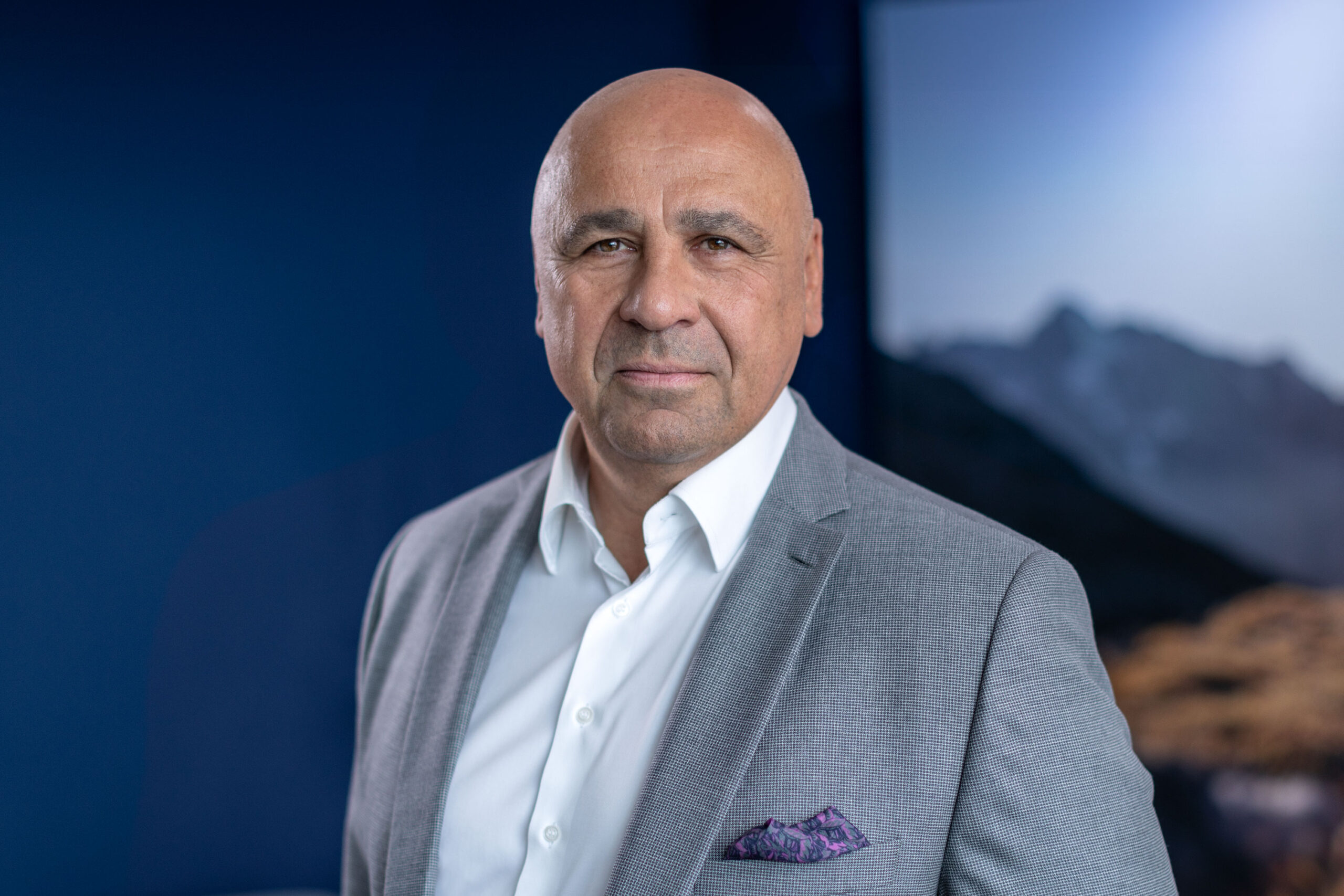At PwC, your responsibilities include innovation, corporate management and leadership. To what extent has the business leader of 10 years ago changed compared to the business leader of today?
If you look back 10, 20 years, business leaders have always worked on two key areas. One was the strategic development of the companies and in particular the fact that from a P&L perspective, especially with regard to shareholders, leaders tried to manage the company with a strong focus on profitability. It was important that the company leaders lived in a more hierarchical structure than they do today and led top-down. Today and in the future, business leaders have to be more aware of the need to work in an agile business environment with multiple decision trees. Above all, the topic of disruptive tendencies has become important for corporate management, as the question arises to what extent strategy can be planned ahead 5 or 10 years. The core capability of a leader to develop and execute a coherent strategy is challenged due to the increased complexity and dynamics of the business environment. This means that constant learning, an open mind-set, and the ability to lead the company under these circumstances has reached a new level of leadership skills.
What do companies and corporate leaders need to pay particular attention to and how do they keep their leadership position in the future?
We have carried out CEO surveys over the last 20 years and have seen that the attrition at the board level is on the rise, particularly in the DACH region. Therefore, there are three topics that have to be considered. Firstly, you should choose the board of directors and the CEO carefully with the expectation that a CEO will be in office for more than 3 to 4 years (…which is mostly not the case!). This is critical as to address the strategic issues and to avoid creating an artificial pressure situation in which the mere P&L orientation gains superior importance. The second is the issue of diversity. We still have the problem that the boards of directors are not diverse. Not only in terms of gender or minority groups, but also in terms of educational background. If you look at German boards of directors, they are still strongly influenced by the overrepresentation of traditional university graduates. So, it would be quite good to have a more diverse educational background, e.g. people who bring in other perspectives and experiences. Then the topic of internationality. In some sectors, e.g. the pharmaceutical industry, we usually have very international board members, but most German companies are still dominated by „Germans“. Especially when you take into account that we have 50-70% of revenues from exports (Asia, US), it would of course be logical to appoint board members who come from outside Germany, for example from America or Asia. And the last thing I have always seen as a result of my consulting work is that the board members, who are authentic and who have demonstrated a certain value orientation in their professional life, and I would go so far as to say in their family life, are usually the ones who can perform this orientation function towards the employees and the firm´s culture. Value-based leadership will become even more important for the long-term success of corporations “Values create values”.
Are there any differences between family businesses and large companies in this respect?
Of course family companies are also interested in the success of the company, but the tradition and history of the company and possibly also the involvement of one’s own family plays a completely different role. This means that many of the business decisions are made with a time horizon of 10+ years. Usually, such decision making is positive for the given company, demonstrated in the thriving development of German family businesses. When you talk to family entrepreneurs, you get a completely different and holistic view of the company than if you were to talk to a pure group board member. Of course, when it comes to governance, the role of the supervisory board or, in the case of family businesses, the shareholders‘ meeting is highly important. One should not panic and constantly change the CEO but should carry out the CEO selection very thoroughly and cooperatively coordinate the agenda that will take the company at least 5 years forward.
In an interview with PwC on the study „New Entrants – New Rivals“, you warned that the digital transformation and the speed and force of the disruption it entails are still underestimated by many management leaders. What more needs to change for companies to master the digital transformation?
In the study we pointed out that traditional industry structures are disintegrating. Let me give you a small example. In the last three years, the automotive industry has acquired over 400 companies, primarily in the area of start-ups outside the traditional automotive industry, in order to bring new skills and competencies on board. One example is the automotive and health industry: How can the automobile be geared towards collecting health data in the future? New structures will be created or appropriate start-ups acquired. Bringing these competencies and capabilities on board naturally causes problems, as companies generally tend to take on acquisitions and put their own structure over them. This has gone wrong for many companies. As a result, they have a relatively high attrition rate among start-ups. So, the lesson is clear: when you make such an acquisition, especially outside the core industry, you must be willing to take a certain amount of risk in order to guarantee a degree of freedom.
In this context, do you see the appointment of a ‚chief digital officer‘ as an effective measure to drive transformative change, or is this a role that should be taken over by existing board members?
I think it depends a bit on the maturity of the company. For companies that are just starting out with digitalization, it is recommended to appoint a chief digital officer, possibly at the top level, as many companies have done. However, it is also important that the interfaces to the other board positions are clear, as grey areas often arise and to some extent classic line managers see themselves as key responsible for moving the digital transformation forward. In companies that are far advanced in digitalization, such as the telecommunications or media industry, I would say that digital transformation is part of the DNA of every board department. It is not just about front office transformation or the introduction of Industry 4.0 and so on, but also about driving the internal digital transformation forward – workplace of the future, upskilling of own employees and so on. Each board department should take some responsibility for this and ultimately the CEO as the top leader must be able to communicate this digital transformation well, both internally and externally.
In your opinion, how important is employee freedom to keep a company innovative, modern and agile?
In general, I would say that the degree of freedom is extremely important. The topic of creativity has taken on a completely different dimension. The key issue that you have seen over the last 5 or 6 years is that many of the needed innovations are difficult to come from within the company. As a result, business leaders need to deal with working within an extended ecosystem, for example with start-ups or digital boutiques. At the same time, they should also hire employees who may have different profiles than in the past. These employees must be given organizational freedom, e.g. units or entities that are less influenced by hierarchy should be created for work in a more open environment.
And to what extent are young companies & start-ups supported by PwC?
We have various programs. Firstly, we challenge every industry leader to scan the market for innovations, specifically in start-ups, and to understand as well as integrate certain appealing innovations. Secondly, we have our own unit that only deals with start-ups. Therein we analyze individual industries, which start-ups are currently on the market, which products they have and how their chances of success are. We then organize so-called “Next Level” Start-up structures, where we coach the start-ups helping them progress in terms of presentation skills, financial stability and corporate management issues. In industry fairs we bring them together with our industry mandates and potential investors who are interested in seeking and developing start-ups.
Climate change and pollution is an increasingly international issue. How does this affect the governance and corporate values of globally active industrial companies?
This will be „the issue“ for the next 5 to 10 years and it has various implications. As I said at the beginning, corporate leaders used to look closely at shareholder value. What we see today, however, is that shareholders or stakeholders pay close attention to whether a company is moving towards sustainability. This becomes clear when you look at BlackRock, for example, who said that they only invest in companies that include sustainability on their agenda. The KPIs in the company will also change. New topics like CO2 emissions and CO2 neutrality will become important KPIs in many areas. We should not underestimate the pressure from the public and the media, who want to see that companies that are forward-looking are positioning themselves differently. There is, of course, one major difficulty: I believe that there are many misunderstandings and false paradigms in people’s minds and that the topic of CO2 emissions is sometimes too ocused on individual industries, for example automotive or airlines.
And what role does sustainability actually play in innovation processes?
On the one hand, all innovations should be part of how you judge innovations. And then, of course, there are industry-specific topics such as autonomous driving or CO2-free flights, or even compensation payments that customers may make to improve the CO2 balance. However, at the moment at least in the German-speaking world, customers are happy to talk and think about CO2 emissions, but are not prepared to pay compensation. We have several companies as clients who have implemented measures where, for example, a contribution is made to flight bookings so that the flight is CO2-free. However, the percentage of those who follow these measures is currently in the range of 1-3%. I believe that the change will be even stronger here. To come back to the topic of innovation, sustainability is an absolute important area of innovation for us as consultants, and we also take measures internally. Every month we track the CO2 emissions caused by our travel activities for example. We also try to run our offices in a very ecological way in order to turn off certain issues and to make progress in PwC’s CO2 neutrality.
In 2005, together with Gregor Vogelsang, you published a book entitled „Die Neue Elite“, in which you discuss why our society needs an elite, which elite we will need in the future and how a new elite can be promoted. Since the concept of elite often leads to misunderstandings and problems of acceptance, the first question that comes up is what your notion of an elite is?
Yes, this is a sensitive topic because especially in Germany there is a very tense understanding of what elites are, and particularly in German history elites have undergone some disastrous developments in terms of value orientation and their impact on society. I think what is important for elites today are two issues. One is that elites must show leadership, i.e. take responsibility and behave in a strongly value-oriented way. They have to exert influence, not only by publishing things conceptually and in terms of content, but also by trying to influence certain topics in their individual areas, namely society, politics, or the economy. Further, the topic orientation is of significant importance to us. Elites should provide points of orientation, especially as for employees. They should take a long-term view and critically reflect on the individual decisions they make every day. We have summarized this under the concept of the LEO principle – leadership, exerting influence and providing orientation – and we still think that the impact on a company is enormous, especially with regard to value orientation. “Values create values” as we experience with our clients. Companies that are value-oriented tend to work very long-term, have a lower attrition at the management level and have a strong tendency to deal with social issues more strongly and not just commit to the shareholder principle.
Based on the results of the Pisa study at the time, you pointedly formulated: „As far as education is concerned, we already live in a class society again and do not even notice it. At the same time, you demand that everyone must have the chance to become an elite and that there should be no standardized elite education. What does the situation look like now, 15 years later? Has the advancement of children from socially disadvantaged backgrounds become easier?
What we see, especially in the Anglo-American area of the US & England, is that children from wealthy families have more chances of advancing through private schools and universities than children from socially deprived families because of the fees they have to pay, despite sponsorship programs. Incidentally, it’s very similar in France: if you don’t study at a grande école, you are already second class. I believe that we have an open system in Germany. Universities are freely accessible, anyone can go to grammar school, socially disadvantaged families are also supported through certain student and pupil programs, which is very good. An important issue is that companies have to be prepared to support pupils and students from socially disadvantaged families. In most cases they have the advantage that qualities such as motivation, commitment and the energy to get ahead are much more pronounced than in the case of pupils and students who come from wealthier families. Of course, we have an education problem in Germany. When I look at schools or sometimes universities, we are behind in the area of digitalization and some adjustments need to be made with regard to the learning material. We also need to get the next generation through the education cycle much faster. Admittedly, there have already been some changes, e.g. the introduction of bachelor’s and master’s degrees, which is a good step, but the second thing is also practical orientation. That’s why I don’t believe, and I can see this internally, that the classic path – a great Abitur, fast studies, good grades, then entry into companies, etc. – is always the right one. Many people should also take the path of perhaps first getting vocational training, then further focused training and lastly joining a company. Why is this important? Because we often see that the topics of social competence and emotional intelligence simply have to be promoted through practice-oriented training.
Currently, many industries are feeling the global uncertainty caused by Brexit, trade conflicts and economic sanctions. Which characteristics and skills will be particularly important for elites in the future?
This is a very complex topic. We see the tendency that Europe is finding itself caught between the US and China. These blocks stand in competition to each other, which largely overshadows European trade concern. Especially in the area of innovation, e.g. cloud technologies, we are simply too small and fragmented in Europe with the consequence, that many successful start-ups tend to go to the USA instead of staying here in Germany. Elites must be a mouthpiece here. On the one hand, they should act as an interface between board members, CEOs and politicians. That also means clearly articulating the economic agenda and doing so in a consensus with all the social partners. In other words, not only argue in a purely neoliberal way, but also try to involve workers, unions and social groups. On the other hand, one must of course also do good groundwork in terms of content in order to recognize the influences on the company that may come from the global economic situation and then also be prepared to make corresponding decisions. These can sometimes be very tough and can also lead to the relocation of production facilities and research and development centers abroad.
Currently, the coronavirus is causing concerns. How will the coronavirus affect the economy and how big do you think it can be?
I am not a medical doctor, but the economic impact is already visible and massive. As most of us, I listen to the experts what will happen and what we can do to protect our families and friends. Most important is to solve any health topics in our societies which is on a critical path already and shows major gaps in our system.
We have interruptions in value chains and effects on the supply side. Many of the products can currently not be delivered which will led to issues like short-time work, temporary factory closures and revenue shortfall in all areas of the economy. The demand broke down in a major way and will need years to recover. On the other hand, I am confident that especially Europe and the EU is reacting and is trying to build up the appropriate protective measures for our society and economy. Of course, nobody knows what will really happen post the pandemic break. This will lead to considerable economic repercussions, i.e. recessions everywhere, unemployment will go up and will impact the global economic climate in a major way. So, we all hope that the virus will get under control and that in a few months’ time we will see that we make good progress against COVID-19 and our economy survived the outbreak. Resilience will be the new topic in Executives circles for the coming years and will lead to changes in footprint, value chains and governance.






